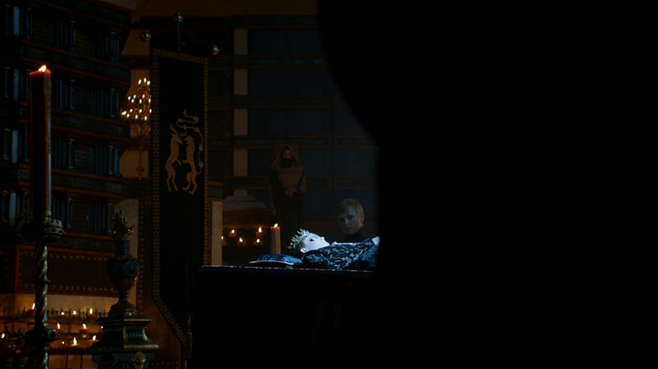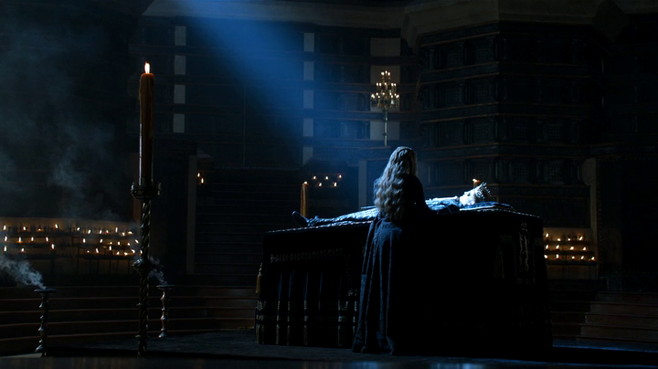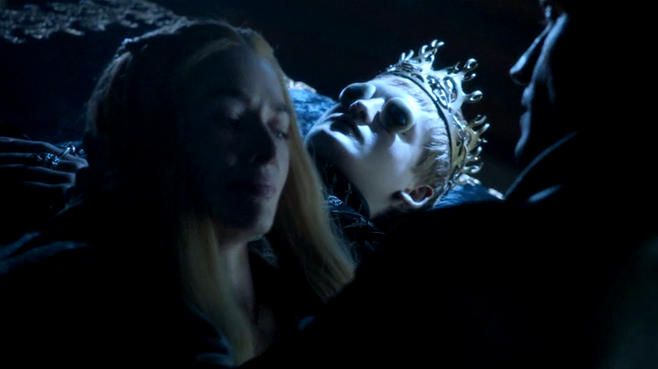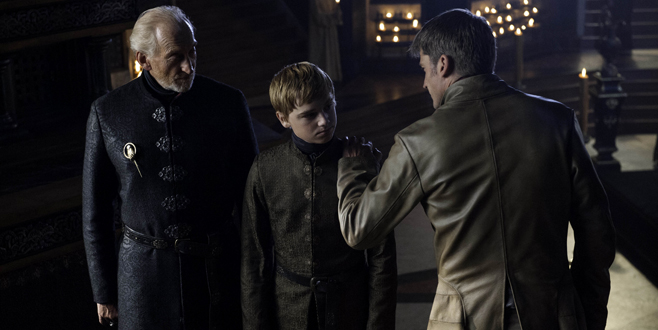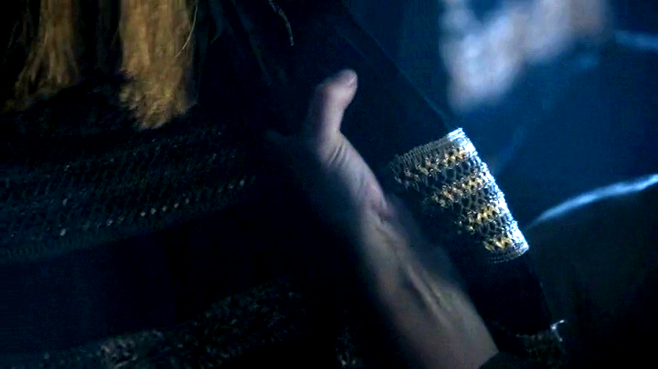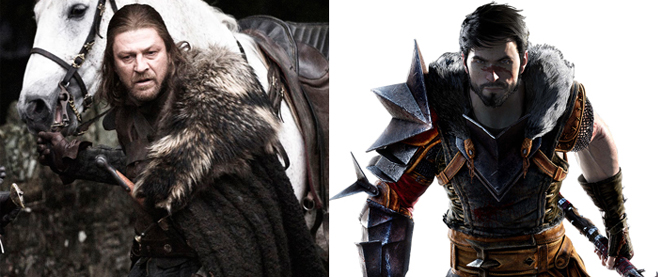
Queen Without a Throne
The scene takes place in a dimly lit chamber whose narrow stained glass windows cast a feeble light on the body of a dead boy: the former King Joffrey.
But the scene’s first shot is not of Joffrey. It’s of Cersei and Tommen, Joffrey’s mother and younger brother. Cersei Lannister stands in the exact center of the shot, but it’s Tommen the camera favors, putting him in focus while a blurry Cersei stands in the background.
Within seconds, Tywin Lannister, Cersei’s father and Tommen and Joffrey’s grandfather, appears. The camera switches to an angle behind him as he enters, his dark-robed body eclipsing both Cersei and Tommen as he enters the chamber. Then as Tywin continues to walk, his body shifts so that Tommen is once again visible. Cersei, however, remains overshadowed.
Tywin immediately begins quizzing his young grandson on what it takes to be a good king. “This is hardly the place or the time,” Cersei protests, without lifting her eyes from Joffrey’s body. Neither Tywin nor Tommen acknowledge her. Now, as Tommen answers his grandfather’s questions the camera gives us the same angle with him in the foreground and Cersei in the background, but it’s Cersei who is in focus while Tommen is blurry. Cersei’s tight jaw and quick swallowing signal barely suppressed anger. She clearly knows what is happening as — with just a few well-phrased questions Tywin drives Tommen to the answer that a good king is a wise king — then positions himself as Tommen’s primary source of wisdom. Only then does Tywin steer Tommen out of the chamber, away from Cersei and the dead Joffrey.
As they leave Tywin turns the conversation to marriage. “A king needs a queen,” Tommen offers. “Yes,” Tywin says approvingly. “To further the family line.”
It’s a last parting shot at Cersei, formerly Queen Regent, now as powerless as the boy on the bier before her. ‘You never had power to begin with,’ Tywin is saying to her. ‘You were only ever here to make more kings.’
It’s no coincidence that the scene just before this is of Lady Olenna and her granddaughter Margaery Tyrell, Joffrey’s widow, discussing the changing political landscape of Westeros. But while Olenna plays the game of thrones from the shadows, Cersei has always striven to wield power in the most direct way allowed to her.
German sociologist Max Weber wrote that, “Power is the chance to impose your will within a social context, even when opposed and regardless of the integrity of that chance.” With Joffrey dead and Tommen now under Tywin’s wing, Cersei’s chances of imposing her will within a social context have dwindled to exactly one: her twin brother (and lover) Jaime.
In the novel A Storm of Swords (on which Game of Thrones Season 4 is based) readers see a new side of Cersei and Jaime’s relationship through several chapters told from the latter’s point of view. Jaime describes a relationship in which Cersei is clearly the dominant partner: She is the one who initiated their romance, she is the one who helped Jaime avoid an unwanted marriage with Lysa Tully so he could stay with her, she is the one who suggested Jaime join the Kingsguard and convinced him to give up his claim to inherit their father’s title to do so (Storm of Swords ch. 11). When Jaime is Roose Bolton’s prisoner at Harrenhal, it’s Cersei that he trusts to ransom him, not Tywin or King Joffrey (A Storm of Swords ch. 37). All throughout his captivity and long journey back to King’s Landing, it’s the thought of seeing Cersei again that keeps Jaime going.
Even when he acts without her express command, making Cersei happy is one of Jaime’s prime motivations. He’s not always great at guessing exactly what she’d want — Cersei was angry with Jaime for throwing Bran off the tower in Game of Thrones the book, even though he claimed he did it because he thought it would be what she wanted (A Storm of Swords ch. 1) — Jaime largely seems content with letting Cersei be the dominant member of their relationship.
Yes, Cersei’s decisions are usually ill-conceived and ineffective. Yes, she is selfish and prideful and vindictive. Yes, she is consistently depicted as one of the show’s main antagonists. That doesn’t change the realities of the political landscape Cersei occupies, or the misogyny that consistently tries to disempower her.
By Weber’s definition, Cersei has power. And Jaime, as the father of her children, a strong and skilled warrior, and a rich, noble man, is Cersei’s most consistent source of power. So when he enters that darkened chamber as Tywin and Tommen leave, it should (going by the books) signal a turn of the tide. Joffrey and Tommen are gone, and with them the best part of Cersei’s political power. But now Jaime is here.
Cersei immediately gives him an order — not the most politically astute order, but an order nonetheless: she asks him to kill Tyrion.
The camera continues to disfavor Cersei. When the twins stand together, the taller Jaime’s head is fully in the shot, while Cersei’s chin bobs in and out of view. And when Cersei makes her request, she and Jaime are not in the same shot; the camera separates her anger from his reaction.
In the book Jaime demurs, saying he needs more evidence. In the show he merely embraces her — at least, until Cersei makes it clear she doesn’t want to make out in front of the corpse of their son. Then Jaime calls Cersei a “hateful woman” and becomes violent, and for the first time his violence is not for her but at her, against her.
There is no need to make an argument about whether Jaime rapes Cersei. That is evident, from her physical resistance to her repeated cries of “No, don’t,” and “It’s not right.” And rape is not about misplaced romance or lust, even between people who have had consensual sex before. Rape is about power. And in Weberian terms, Cersei’s rape represents the violent loss of her most powerful chance to impose her will on anyone else in Westeros.
During the rape, the camera intentionally keeps Joffrey’s body in as many shots as possible. In at least one, the camera’s focus is on Joffrey instead of the twins as they struggle with each other. This constant reminder of Cersei and Jaime’s dead son serves to increase the scene’s “horrible” factor, but it also continues to serve as a reminder that Cersei has, from a political lens, lost her queenship even as she, in suffering a rape by her once-loyal brother, loses her last defender.
This scene, from its first shot of a blurry Cersei to its last moments of Jaime raping her, demonstrates how the misogynist institutions of Westeros, and the men who represent and guard them, are stripping Cersei of any political or personal power she had managed to accumulate. The last shot in the scene is a close-up of Cersei’s hand, clutching the cloth of Joffrey’s bier, the last vestige of her political power, as Jaime rapes her.
Up until this point I’ve avoided making a judgment on whether it was “wrong” to include a rape scene in the episode. The rape itself was disturbing, violent and wrong, and Jaime was all kinds of wrong to perpetrate it.
But perhaps the show’s creators will use this rape as a means of refocusing narrative attention on Cersei. Perhaps the scene’s systematic depictions of her powerlessness were meant to begin an examination of Cersei’s character and the political systems that have shaped her.
Perhaps the show’s creators intend to break with the book by depicting a more human and sympathetic Cersei. Even by the end of the fifth Song of Ice and Fire novel Cersei remains one of the most unambiguously “evil” characters in a huge and morally diverse cast. She is also the only woman in the entire series who exerts any kind of direct power over the Iron Throne, and the most visible female political force in Westeros. In the books, only Daenerys is in the same category.
Perhaps, aside from being intentionally political, the choice to depict a rape was intentionally personal. After all, 48 percent of Game of Thrones’ viewership is female (according to 2013 Nielsen data provided to Wired.com) and one in six American women have experienced an attempted or complete rape, according to the Rape, Abuse and Incest National Network.
But here’s the problem with the rape in “Breaker of Chains.” Do we really expect the show to make a meaningful statement about the tenuous grip Westerosi women in general, and Cersei in particular, has on power? Do we even expect the show to deal with the emotional and physical consequences of experiencing or perpetrating a rape?
No, instead the following episode (“Oathkeeper,” which aired Sunday night), paints Jaime in a very positive light. After visiting Tyrion in prison and reconfirming his brotherly commitment to him, Jaime visits Cersei. “Your Grace,” he addresses her as he enters her chamber. Does his use of her royal title signify deference, as if to apologize for his assault? Or is it mocking, to spite Cersei for being a “hateful woman?” Cersei’s sarcastic reply of, “So formal,” leaves it ambiguous.
Cersei’s behavior in this scene is very depoliticized; she is in her personal chambers, not a royal cathedral (or “sept”), and Joffrey, in his stately formality, is nowhere to be seen. Instead, Cersei’s scene in “Oathbreaker” is very personal, which makes their conversation that much more emotional but removes Cersei from any discussion of her political standing. It also contains a much better version of Jaime and Cersei’s separation than the rape was (or should have been) in “Breaker of Chains.” Jaime admits that the reason he was able to return to King’s Landing is because he promised Catelyn Stark he would return Arya and Sansa Stark to her. But now Cersei wants Sansa dead. She asks Jaime if he would go find and kill Sansa for her. Jaime’s hesitation answers her question. Furious, Cersei turns away from the brother whom she once trusted to be her military strength. This moment succeeds far better, both visually and emotionally, at signalling the rift between Cersei and Jaime, than the apparently consequence-free rape of the previous episode did.
It’s unlikely that the rape will ever be mentioned again, considering the episode’s director, Alex Graves, didn’t even know he was filming a rape scene. “Well, it becomes consensual by the end, because anything for them ultimately results in a turn-on, especially a power struggle,” he told entertainment news site HitFix. In a later interview with Hollywood Reporter, Graves does describe the scene as a rape, but then switches to the term “forced sex,” which is, of course, a euphemism for rape.
Graves seems to be suggesting that Cersei was enjoying Jaime’s sexual assault in the sept because she likes power play. That is utterly incongruous with the Cersei of the books, who clutches so desperately at the control which she is so categorically denied, and the Jaime of the books, who (at least at this point) has consistently let Cersei take the lead in everything they do together. Graves’ comment perpetuates the dangerous and horrifically enabling myth that women secretly “enjoy” being raped. But that aside, the dialogue and camera work of the scene in question do not depict a “power struggle,” much less a consensual tryst.
The creators were aware that at least the beginning of the scene concerned Cersei losing her clout with Tommen. Graves described it to Hitfix as “the gentle verbal kidnapping of Cersei’s last living son.” He later used similar language in the Hollywood Reporter interview , describing it as “Charles [Dance, who plays Tywin] kidnapping Lena [Headey, who plays Cersei]’s son with words for three minutes of monologue.” The episode “Oathbreaker” also continues this theme in Margaery’s scenes, where Olenna says Margaery must ingratiate herself with Tommen before Cersei can turn him against his bride-to-be. Later in “Oathbreaker,” when Margaery visits Tommen in his bedchamber, the boy says his mother wouldn’t want her there, to which Margaery responds “It’ll be our little secret.” Tywin now has competition in his play to take Tommen away from Cersei. Clearly the show’s creators are interested in Tommen’s fate.
Yet in that same interview about “Breaker of Chains,” when Graves switches from Tywin “kidnapping” Tommen to Jaime’s rape of Cersei, he drops a political analysis in favor of defending Jaime as a misguided romantic. “Jaime is still trying to believe as hard as he possibly can that he’s in love with Cersei. He can’t admit that he is traumatized by his family and he’s been forced his whole life to be something he doesn’t want to be. What he is—but has to deny— is he is actually the good knight, like Brienne.”
There is no discussion of how Jaime being a “good knight” comes partially from his preventing Brienne from being raped in season three. Nor, more importantly, is there any discussion of what the scene means for Cersei, or how she too is “traumatized by [her] family” and “forced [her] whole life to be something [she] doesn’t want to be.”
These quotes from Graves told Game of Thrones viewers, even before “Oathbreaker” aired, that they can probably expect no acknowledgement of Cersei’s loss, no nuanced treatment of the tenuous hold women have on power in Westeros. After all, the show’s creators did the same thing to Daenerys, turning her consensual sex with husband Khal Drogo into a terrifying rape scene in the show’s very first episode. Though in the moment that rape too emphasized the treatment of women in political as well as personal relationships, it was never again addressed, and the Daenerys of the show fell in love with her rapist just as wholeheartedly as the Daenerys of the book fell in love with her patient and respectful husband.
Every moment in scene in the sept depicts a woman constrained by patriarchy and loss who is shown to lose every source of political power she had once possessed. The episode of Game of Thrones is entitled “Breaker of Chains,” and amidst its scenes of Daenerys triumphantly hurling broken chains at slave owners, it gives us a woman whose chains have only gotten heavier.
Follow Jill Scharr on Twitter @JillScharr.

